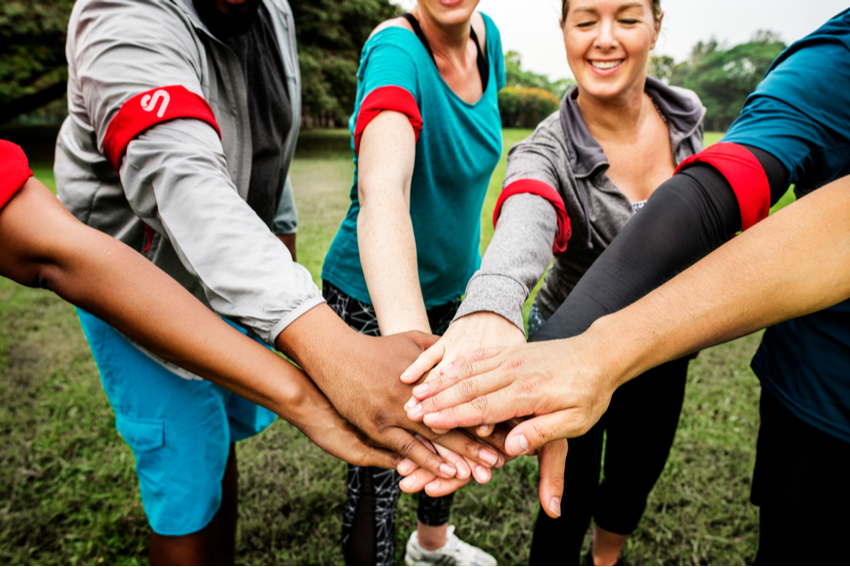Identifying Engaging Team Structure Activities That Promote Problem-Solving Skills and Innovative Assuming Among Coworkers
In today's swiftly evolving work environment, promoting analytic abilities and creative thinking with team-building tasks has actually come to be vital for organizational success. Checking out these inquiries can illuminate pathways toward a much more vibrant team setting.
Recognizing Group Building Advantages

In addition, group building serves to reinforce interpersonal relationships among associates, which is crucial for efficient communication. When group participants develop trust fund and connection, they are more probable to share info freely and seek support when required. This harmony not only improves private performance however likewise boosts overall team efficiency.
Furthermore, team building activities can significantly boost morale and motivation. Employees that join appealing experiences really feel a lot more linked to their organization and are most likely to demonstrate boosted dedication and performance. A determined labor force is much better furnished to tackle problems artistically and efficiently.
Ultimately, understanding the advantages of group building is crucial for companies aiming to boost analytical skills. By buying these tasks, companies can produce a more natural, cutting-edge, and durable workforce that is prepared to satisfy the demands of a vibrant organization atmosphere.
Qualities of Effective Tasks
Effective team structure tasks share a number of essential attributes that improve their performance in creating problem-solving abilities. They need to promote partnership amongst team members, urging open communication and cumulative brainstorming. This collaborative setting enables people to take advantage of varied point of views, which is crucial for cutting-edge problem-solving.
Second of all, efficient tasks are developed to be challenging yet achievable, pressing participants to think seriously and creatively. These jobs ought to call for teams to browse barriers, assess info, and develop strategic services within a defined duration.
Another vital characteristic is the element of reflection (Orlando team building activities). Activities that include debriefing sessions make it possible for participants to examine their approaches, learn from failings and successes, and apply these insights to future difficulties
Additionally, effective activities frequently incorporate real-world situations relevant to the group's job context. This not only boosts engagement yet likewise guarantees that abilities established during the activity are transferable to everyday jobs.
Imaginative Problem-Solving Workouts
Innovative problem-solving workouts play an essential duty in improving a team's capacity to take on complex difficulties. These tasks cultivate an atmosphere where employee can think outside package, encouraging cutting-edge options with partnership and diverse viewpoints.
One efficient exercise is the "Reverse Brainstorming" strategy, where participants determine possible troubles or challenges associated with a project. By focusing on what can fail, groups can devise strategies to mitigate these issues and boost creativity. An additional useful workout is the "Mind Mapping" method, which enables group members to visually organize their ideas and ideas around a central theme, promoting connections and insights that may not emerge via traditional brainstorming.

Additionally, the "Six Believing Hats" approach urges individuals to technique troubles from various viewpoints, such as psychological, analytical, and innovative point of views. This organized method aids groups check out a variety of angles, resulting in extensive solutions.
Integrating these imaginative analytic workouts right into team-building activities not just improves cognitive versatility but also reinforces social relationships, inevitably adding to an extra cutting-edge and cohesive team dynamic. Such exercises are vital for fostering a culture of imagination and versatility in the office.
Collaborative Obstacles for Groups
Many collaborative difficulties can substantially improve a team's problem-solving capacities while advertising unity and communication. These tasks need participants to participate in cumulative reasoning, cultivating a setting where varied point of views can be shared and valued.

Furthermore, group scavenger hunts can be designed to include specific analytical tasks that require calculated thinking and collaboration. By participating in such challenges, staff member find out to navigate problems, create count on, and value each various other's staminas. Orlando team building activities. Inevitably, collective difficulties contribute in cultivating a natural team dynamic that flourishes on innovation and shared success
Measuring Success and Outcomes
To properly determine the success of team-building activities targeted at improving analytical skills, it is vital to develop clear metrics and preferred end results. This process starts with specifying particular purposes, such as improved cooperation, enhanced creative thinking, and improved vital thinking amongst staff member. By expressing these goals, organizations can tailor tasks that align with their vision.
Quantitative procedures, such as pre- and post-activity studies, can offer beneficial insights right into individuals' understandings of their analytic abilities. Furthermore, tracking efficiency metrics-- such as project conclusion prices or the efficacy of use this link options designed throughout team-building workouts-- can indicate the influence of these tasks on total performance.
Qualitative assessments, consisting of individual feedback and empirical studies, can additionally enrich more helpful hints the evaluation process. Promoting open discussions post-activity enables teams to review their experiences, fostering an atmosphere of constant renovation.
Ultimately, measuring success is not merely concerning evaluating immediate outcomes however likewise keeping track of lasting behavior adjustments within teams. By regularly assessing the efficiency of team-building efforts, companies can refine their approach, making sure ongoing advancement of analytical skills and creative thinking abilities among associates.
Final Thought
In final thought, choosing appealing team-building activities that foster problem-solving skills and creative reasoning is necessary for improving partnership among colleagues. Effective workouts, such as Reverse Thinking and Getaway Space challenges, not only boost critical reasoning however additionally advertise a culture of imagination. By incorporating real-world scenarios and reflective debriefing sessions, groups can reinforce social partnerships and grow a resilient workforce, inevitably contributing to collective success and boosted business morale.
Effective group building cultivates cooperation and enhances analytical abilities within a company.In addition, team building tasks can dramatically improve morale and motivation.Successful group building tasks share several vital attributes that improve their effectiveness in creating problem-solving abilities. By focusing on what can go wrong, groups can develop techniques to mitigate these problems and stimulate innovative reasoning.Additionally, group scavenger hunts can be created to include particular analytic tasks that call for tactical reasoning and collaboration.